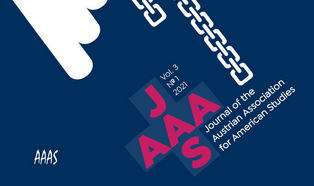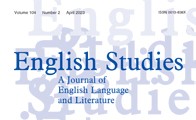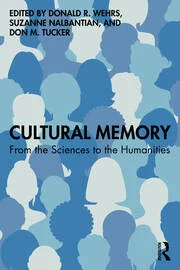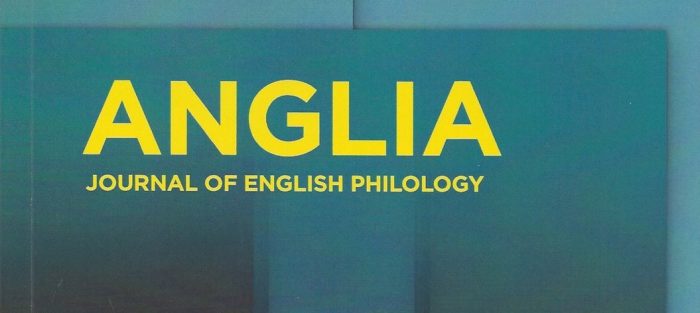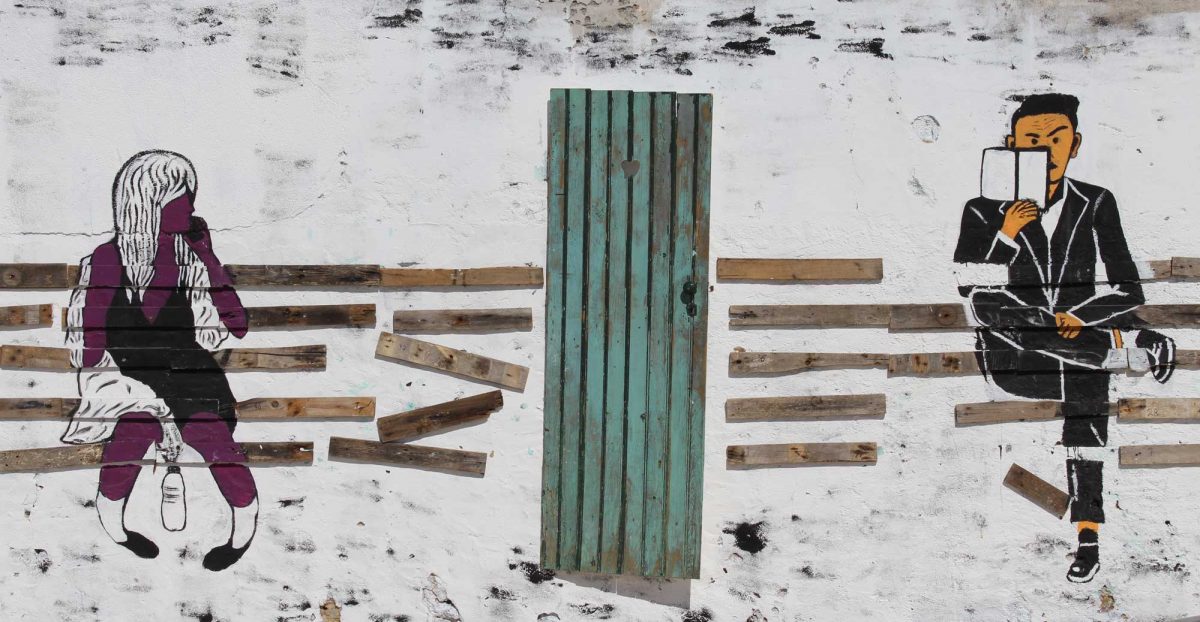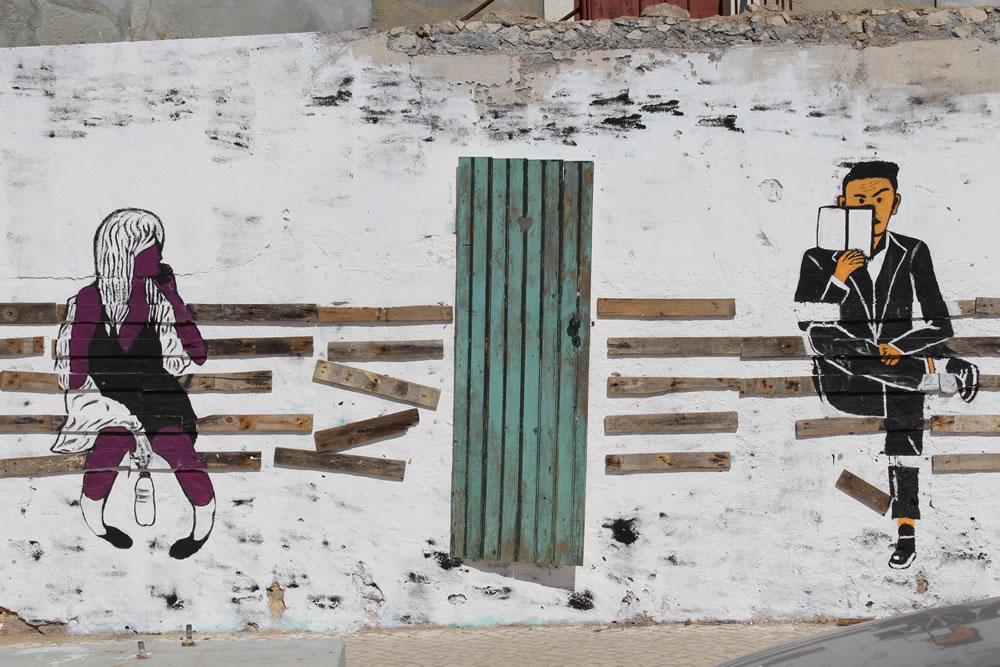Marijana Mikić has published a book review of Literary Afrofuturism in the Twenty-First Century, edited by Isiah Lavender III and Lisa Yaszekin (Ohio State UP 2020), in the Journal of the Austrian Association for American Studies (JAAAS).
New Publication by Alexa Weik von Mossner on Omar El Akkad’s American War
Alexa Weik von Mossner has published a newl article entitled “Tracing Loss in Times of Rapid Climate Change: Figures of Absence in Omar El Akkad’s American War“ in the journal English Studies
Omar El Akkad’s American War (2017) presents a dark vision of what the United States might devolve into if climate change, haphazard adaptation, and the political polarisation of the country continue unchecked. Analysing the four overarching facets of trace—visibility, materiality, environment, and human interaction—on the level of the novel’s narrative composition, the article argues that El Akkad offers more than just a cognitively estranged story about the making of a future American terrorist. Foregrounding the complex relationship between its central protagonist’s personal losses and the bitter war she fights in a climate-changed environment, American War deliberately employs what El Akkad has called “weaponized empathy” to allow readers to understand on a visceral level what drives people’s thoughts and actions once they have been robbed of the things and people they care for and embody the traces of what has been lost.
New Publication by Alexa Weik von Mossner on Narrating Indian Food as Cultural Memory
Alexa Weik von Mossner has published a book chapter, entitled “Nourishment for the Mind: Narrating Indian Food as Cultural Memory,” in Memory: From the Sciences to the Humanities, edited by Donald Wehrs, Suzanne Nalbantian and Don Tucker (Routledge 2023).
The chapter explores how the complex relationships between food, memory, and culture are represented and evoked in ethnic American cultural texts. Memories of food are more than just personal recollections of a particular dish – they are both intensely personal and embedded in larger collective memories, dietary traditions, and culinary practices. They also play an important role in identity formation and sustain social and cultural worlds, not only in the place in which they were formed but also in diasporic communities far away from that place of origin. This is particularly obvious in a country like the United States with its long history of immigration. For successive waves of immigrants, the dishes they consumed and cherished became a means of negotiating the degree of their assimilation to mainstream U.S. culture, on the one hand, and a means to hold on to their cultural roots, on the other.
The chapter considers a conjunction of literature and film – among them Shoba Narayan’s Monsoon Diary: a Memoir with Recipes, Jumpha Lahiri’s short story “Mrs. Sen’s,” Jason Zeldes’s Ugly Delicious episode “Don’t Call It Curry,” and David Kaplan’s feature film Today’s Special – that represent and remember the culinary traditions of India and, by extension, those of Indian Americans. Making connections between empirical-scientific and historical-interpretative levels of analysis, the chapter demonstrates that narrated food memories, along with the sensual evocation of the remembered dishes and their preparation, play an important role in how writers and filmmakers invite their audiences to appreciate and/or celebrate the food and cultural identity of an ethnic minority group. Whether it is the visceral evocation of specific dishes and/or their preparation that is foregrounded, or characters’ personal relationship to them (or both), such acts of narrativization always comment to some degree on issues of identity and U.S. racial politics.
Guest Lecture by Derek C. Maus: The Benefits of a Comparative (and Expansive) Approach to American Literature for Austrian Students
Wednesday, October 12, 2022 at 12:45 in HS4 at the University of Klagenfurt, presented by the Narrative Encounters Project
Studying literatures from outside one’s own cultural/national/linguistic/ethnic background requires navigating through an interpretive Scylla and Charybdis. One extreme creates overly touristic readings that merely “honor” or “sample” local variations without also seeking to understand how and why they matter to a text’s reception outside its originating culture; the other assigns value to a work exclusively on the basis of its potential to transcend spatial and temporal borders. The narrow path between these two options involves remaining receptive to the unfamiliar without prejudging it – either positively or negatively – because of its alterity. Every scholar can bring his or her personal experiences and values to bear productively on a text provided that those experiences do not impart rigid expectations about what kind of literature is worthy of consideration.
Derek C. Maus is Professor of English and Communication at the State University of New York at Potsdam, where he teaches numerous courses on contemporary literature from all over the world. He has published numerous books and articles, most of which have focused on the subject of satire. His full CV, samples of his work, and other scholarly information can be found at https://potsdam.academia.edu/DerekCMaus.
Imagine credit: Alias
Guest lecture by James J. Donahue: Decolonizing American Literary Studies: Some Thoughts Toward a Native-Centered Pedagogy
Wednesday, October 12, 2022 at 12:00 in HS4 at the University of Klagenfurt, presented by the Narrative Encounters Project
North American scholars have recently begun talking about „decolonizing“ academic fields of study, many of which have historically contributed to the larger continuing project of the colonization of Indigenous peoples. Following some key principles drawn from Indigenous pedagogies, this lecture will offer suggestions for ways we might begin to „decolonize“ the teaching of American literature. What books and courses do we teach? What work do we ask our students to complete? Why should we teach this material at all? By attending to these questions with practices derived from Indigenous pedagogies, perhaps we can begin to better understand and challenge the underlying colonizing mindset that has informed much of the history of this field of study.
James J. Donahue is Professor in English and Communication at SUNY Potsdam (USA), where he holds a secondary appointment in Interdisciplinary Studies as coordinator of the minor in Native American Studies. He is primarily interested in exploring the complex literary and cultural tensions of twentieth century America and is the author of Contemporary Native Fiction: Toward a Narrative Poetics of Survivance (Routledge 2019) and co-editor of Narrative, Race, and Ethnicity in the United States (OSU Press 2017).
Image: : Fungus Guy
New Publication by Marijana Mikić on Jessie Redmon Fauset’s Plum Bun: A Novel Without a Moral
Marijana Mikić has published an article in Anglia: Journal of English Philology, entitled “Mind, Body, and Race in Jessie Redmon Fauset’s Plum Bun“
Working at the intersection of cognitive and critical race narratology, the essay examines the relationship between the embodied mind and the social construction of race in Jessie Redmon Fauset’s Plum Bun: A Novel Without a Moral (1928/2011). The essay argues that Fauset’s African American passing novel rejects the notion of a solely ‘inward turn’, which is commonly associated with modernist literature, in favor of a more dynamic understanding of embodied cognition that acknowledges the shaping force of race and racialization. Using a seemingly traditional omniscient narrator, Fauset not only draws attention to the failure of U. S. American racial hierarchies, but she also lays bare how race impacts both individual consciousness and social cognition.
New publication by Marijana Mikić on Etaf Rum’s A Woman Is No Man
Marijana Mikić has published an article in Orbis Litterarum, entitled “Arab American women and the generational cycle of shame: A cognitive reading of Etaf Rum’s A Woman Is No Man.“
The article uses a cognitive narratological approach to analyze how Etaf Rum’s A Woman Is No Man (2019) negotiates Arab American patriarchal culture through the lens of shame. By narrating the emotional experiences of Arab American women who bear the pain of shame while they also engage in shaming others, Rum gives readers the opportunity to understand better the complex relationship between the psychology of shame and the “shame of gender” in patriarchal Arab American culture. Not only does A Woman Is No Man articulate the lived experiences of one of the most “forgotten” and silenced ethnic groups within American literature and culture, it also draws attention to how gender-based shaming is shaped by, and contributes to shaping, a culture of patriarchy and male power. The novel uncovers the different ways in which shame impacts the minds and bodies of Arab American women across three generations, while also laying bare the psychological, gendered, and socio-culturally embedded aspects that shape the elicitation, experience, expression, and regulation of shame.
Final Program for the Narrative Encounters Conference now online!
Please join us for our international online conference “Narrative Encounters with Ethnic American Literatures” from Sept. 2-4, 2021.
Taking a cue from pioneering efforts at the intersection of context-oriented approaches in race and ethnicity studies and post-classical narratology, this conference is interested in the relationship between narrative, race, and ethnicity in the United States.
Our distinguished keynote speakers are:
– Frederick Luis Aldama, University of Texas, Austin
– Paula Moya, Stanford University
– Patrick Colm Hogan, University of Connecticut
The final program is available here.
Find out more on our conference website.
Interested colleagues and students can register for the conference here. There is no fee.
For inquiries, please contact Alexa Weik von Mossner at narrative.encounters@aau.at
The conference is supported by the Austrian Science Fund (FWF) through the Narrative Encounters with Ethnic American Literatures Project
Narrative Encounters Conference on September 2-4, 2021
Our international online conference “Narrative Encounters with Ethnic American Literatures” is coming closer.
Taking a cue from pioneering efforts at the intersection of context-oriented approaches in race and ethnicity studies and post-classical narratology, this conference is interested in the relationship between narrative, race, and ethnicity in the United States.
Reading so-called “ethnic” American literatures means encountering characters and storyworlds imagined by writers associated with various minority communities in the United States. Without doubt, the formal study of narrative can help us gain a deeper understanding of such encounters, but until recently, narratologists rarely grappled with the question of how issues of race and ethnicity force us to rethink the formal study of narrative.
Attesting that the relative “race/ethnicity-blindness” of narrative theory is a severe limitation, scholars such as James Donahue have called for a “critical race narratology” (2017, 3) that addresses this lacuna. A range of recent book publications (e.g. Aldama 2005; Donahue 2019; Donahue, Ho, and Morgan 2017; Fetta 2018; Gonzáles 2017; Kim 2013; Moya 2016; Setka 2020; Wyatt and George 2020) demonstrate that a variety of insights can be gained from narratological approaches that open themselves up to issues of race and ethnicity in conjunction with other important identity markers including class, religion, gender, and sexuality. And, as Sue Kim has noted, there are shared interests in understanding the ways in which such narratives “operate within larger social structures as well as an investment in the scrutiny of how minds and subjectivity work in and through narratives” (2017, 16).
How do ethnic American literary texts use narrative form to engage readers in issues related to race and ethnicity? What narrative strategies do they employ to interweave these issues with other important identity markers such as class, religion, gender, and sexuality? How do they involve readers emotionally in their storyworlds and how do they relate such involvements to the racial politics and history of the United States? And how does paying attention to the strategies and formal features of ethnic American literatures change our understanding of narrative theory? These are some of the questions we hope to address at this conference.
Confirmed keynote speakers:
Frederick Luis Aldama, Jacob & Frances Sanger Mossiker Chair in the Humanities at the University of Texas, Austin
Paula Moya, Danily C. and Laura Louise Bell Professor of the Humanities, Stanford University
Patrick Colm Hogan, Board of Trustees Distinguished Professor, University of Connecticut
The preliminary program for the conference is available here.
You can register for our online conference here. Registration is free of charge.
For any inquiries, please contact us at narrative.encounters@aau.at
Narrative Encounters Conference Postponed
Due to the coronavirus situation, we had to postpone our conference. It will now take place on September 2-4, 2021. To all conference participants, thank you so much for your flexibility! We look forward to welcoming you in Klagenfurt next year.
In order to take some advantage of the situation, we will send out an additional CFP in the coming weeks. If you are interested in the conference and missed the original submission deadline, check out our new CFP next month.

